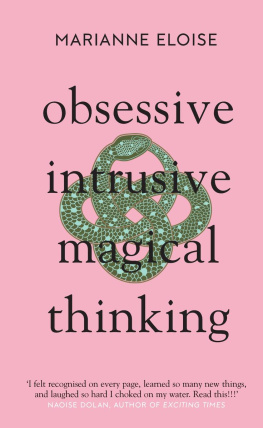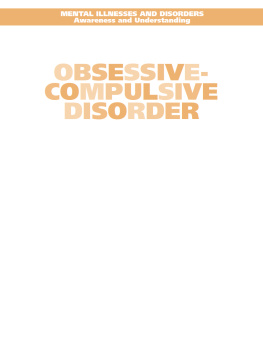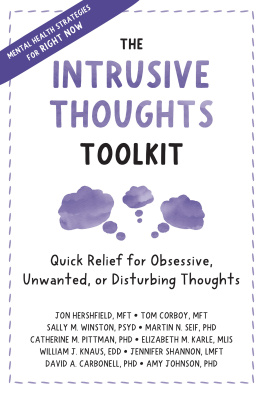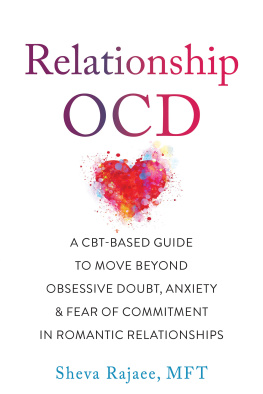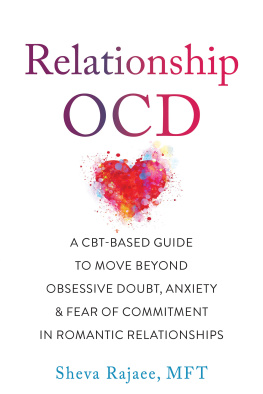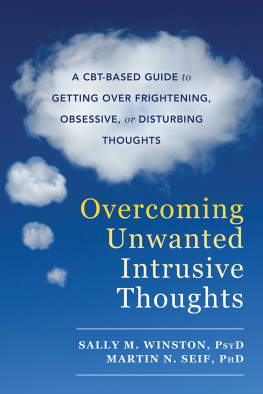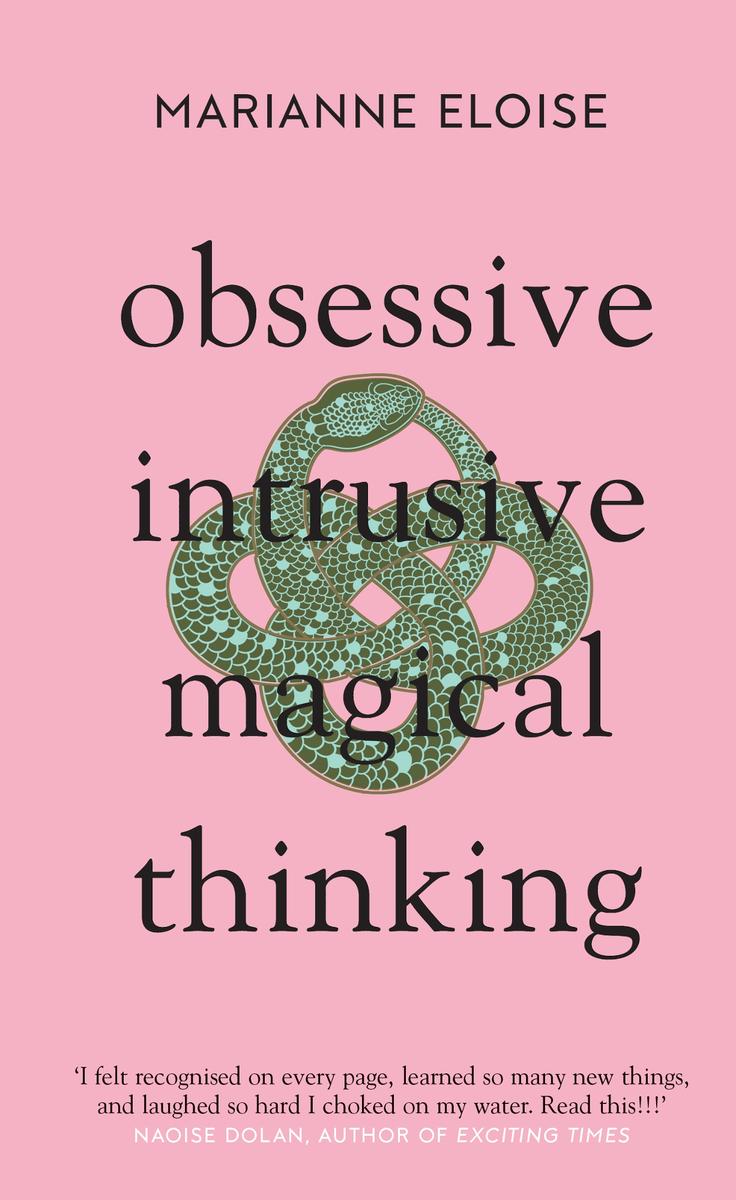I wont claim to know what my first sentient thought was. I do, however, know with absolute certainty that I didnt just have that thought once. I know this not because I have such a big smart brain that I can remember my first twinkles of consciousness as I lay kicking (or whatever babies do) in my crib.
No, the opposite. I know this because I dont have a regular brain at all, if a regular brain is a pink, fleshy mass making sensible decisions. Instead, in the cavern of my skull sits a Scalextric track. The electric car is loaded by an invisible force beyond my control with ideas, phrases and images, and without an exit ramp they swoop endlessly through the abyss in my head, an infinite figure-eight of looping thought patterns.
This is the way its always been for as long as I can remember, so as far as I am concerned, it has always been true. At first I shared those obsessive thoughts with others, asking questions like a tic and seeking reassurance from adults on everything that came into my head. When will I die? Is the house on fire? How do we know were alive? Is Medusa real? Is she after me? What will happen if I wish for what I want? Whats the point of being alive? Whats the highest number I can count to? No but really: is Medusa after me?
Repetition was the only state I knew, whether in my movements or my thoughts or the food I ate or the shows I watched or the colours I wore. I did and thought about everything obsessively. Everything everyone hoped Id grow out of I just didnt, and even when I tried to stop talking, it was never quiet in my head. The cars just kept running, even when I didnt want them to.
Now I know that I dont exactly have what anyone would call a normal brain. Where most people are neurotypical, Im neurodivergent, a big word for just being wired differently. Neurodiversity covers a lot of ways of being different, and my particular way is being autistic and having ADHD. I experience the world in extremes that often make it difficult to function; I feel everything, emotionally and physically, much more than someone else might, and I have less tools to express it. I get overwhelmed by everything: sounds, smells, emotions, textures, food.
Being autistic also impacts how I think. I fixate on both good and bad thoughts and images to a degree most people would consider unhealthy, but I cant help it. Sometimes I say them out loud, too, over and over again, not knowing when to stop. There are lots of big words to describe the way I am: perseveration is one I learned recently, and it means the repetition of a response, such as a word, phrase or gesture, despite the lack of a prompt.
Some people do this after a brain injury, but it sums up my incessant, lifelong impulse to talk and think about whatever interests me. When I googled it I found a lot of panicked parents trying to figure out how to stop their kid talking about dinosaurs, so I stopped wanting to learn any more.
I choose instead to look at it in a more optimistic way than killjoy parents who long to suppress their kids healthy interests. I like it because its root is persevere, to keep going against all odds. I like the idea that I am just so determined to persevere talking about theme park rides or the last book I read or the likelihood of alien life, even long after the life has drained from the other persons eyes. Im not boring or bad at spotting social cues! Im determined.
Obsessive was, still is, my natural state, and I never wondered why. I didnt mind, didnt know that other people could feel at peace. I always felt like a raw nerve, but then, I thought that everyone did. When I was just a few years old, that tendency pushed me to develop obsessive compulsive disorder, but there werent the words for that yet, either. A lot of autistic people have OCD, and it makes sense to me, that wed latch on to something that thrives in an anxious, overactive mind that craves control.
As a child, I didnt have any power to actually control the things that scared me, so I invented it. I used something that mental health experts call magical thinking, the belief that unrelated events are causally connected and our thoughts can alter or influence their course. People with OCD often believe that arbitrary actions or thoughts can impact the things that we are afraid of.
Ive learned that very few people have any clue what OCD is, but I sympathise, because the most agonising things about it happen inside the brain. From the outside, where the intrusive thoughts arent apparent, it might look like ritual cleanliness, fussiness or weird tics. I understand why popular representations are so lacking it is difficult to comprehend how debilitating it is if youve never had it.
So imagine this: the worst thing your mind can come up with.
The most violent image, your deepest fear, something uncomfortably sexual, an annoyance youve been working to avoid. If you had to try at all to muster something up, we are very different. Now imagine that image, or thought, repeated. It echoes around your brain, constantly, without respite. Maybe you can forget it, for a while. Maybe youre on a picnic, or holding your niece, or driving along the coast. It comes from nowhere, interrupting a perfectly nice day, bludgeoning you with the dregs of your own psyche.
Youd start to worry, wouldnt you? That there was something deeply, terribly wrong, somewhere at your core. That you not only didnt choose to think of things so terrible, but that you couldnt stop them. Anyone would do anything to stop it.
So your brain tells you: I can make it stop. All you have to do is everything I say, when I say it. The actions dont require much of you, but theyre completely arbitrary. Run up and down the stairs, tap something 100 times, step into the road without looking. Sometimes theyre less arbitrary. If youre worried youve left the hob on, perhaps, youll go back and check it. Again. And again. And again. Your brain will trick you into believing that youve left it on and youll think youre going insane, but its less trouble to check than it is to have the house burn down.
Or so you think, anyway. These small actions build up as you try to control every aspect of your brain and fears and life, to a point where you dont have much of one anymore. What your compulsions and obsessions demand of you starts to take over the parts of life that you used to love, that you want to partake in. You feel at the centre of a very miserable universe, the sole saviour of everyone and the only person who can prevent bad things from happening, so to speak. So you continue. You persevere until you cant anymore, until you realise that you need some kind of intervention to save you from the one thing you can never escape: your own brain.
OCD is personal: it feeds on whatever you are most afraid of; on your guilt, fear and sense of responsibility. Its born from a need to seek order in a world that doesnt have any, often developing in childhood, when were at our most powerless, with one in 200 children suffering with it. Mine started manifesting when my parents were fighting and divorcing. I often felt alone, responsible for outcomes that I shouldnt have even been considering yet. If I did the right thing the right amount of times, I could save everything, protect everyone. I could even make my parents love me.
Not having the words or treatment for what I felt left space for OCD to run rampant throughout my adolescence, trampling anything good or spontaneous. I was plagued with intrusive thoughts that manifested as everything from compulsive cleaning to self-harm to an eating disorder to an exercise addiction. When my friends spent the summer holidaying in Magaluf and going to clubs and festivals, I stayed inside and made heavy concessions for the few activities I did partake in. If I was going to go out with my friends, I had rituals, set things I had to deprive myself of. I punished myself obsessively for the freedom of one night, and even then the penance didnt stop.

